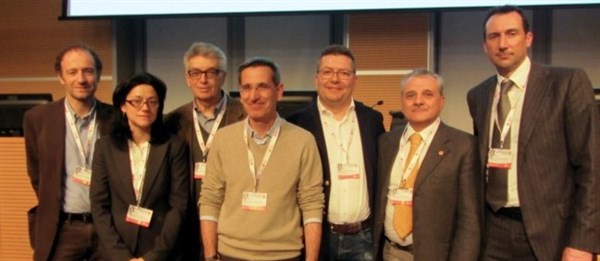The topic of permanent baiting took centre stage in the conference room on the first day of Disinfestando 2017, held in Rimini 8 & 9 March. In keeping with the international theme at this years event speakers had been invited from across Europe.
| Unlike some events where there is a tendency to try to be all things to all people and cram as much into the accompanying seminar programme as possible (our British events often fall into this category), Disinfestando took a more focused approach. On day 1, there was just one major seminar session billed as a round table on the implications of the Biocidal Product Regulation for anticoagulant rodenticides and, in particular the practice of permanent baiting. This commenced at 15.00 so giving everyone plenty of opportunity to visit the exhibition and grab a bite to eat before settling down to hear what the experts had to say.
There had been a real effort on the part of the organisers, the Italian trade association – Associazione Nazionale della Imprese di Disinfestestazione (ANID) – to attract an international audience. Reflecting this simultaneous translation was on offer – Italian into English – very helpful for your roving Pest reporters – and English into Italian as the speakers from outside Italy chose to speak in the international language of business, English. It has to be said that some of the technicalities, and let’s face it the Biocidal Product Regulation is not the easiest of topics, caused some difficulty for the translators, nevertheless, the differences in the approach of the different countries in Europe was soon apparent. Speakers from across Europe Speakers on the situation in Italy, not just relating to permanent baiting, but also to the use of anticoagulant rodenticides more generally and the changes that are on the horizon were: Dr Dario Capizzi from the Lazio region’s environment and natural systems department; Dr Pierpaolo Zambotto from the chemical industry association ASSOCASA providing the rodenticide manufacturers viewpoint; Dr Simone Martini, a research consultant; and Dr Ugo Gianchecchi, a professional pest control consultant. The session was chaired by Professor Pasquale Trematerra and the recently elected President of ANID, Marco Benedetti. To summarise there were some similarities between the countries, but also some wide variation in the approach to permanent baiting – the practice of leaving rodenticide in bait stations for long periods as a means of preventing and/or monitoring for rodents, regardless of whether there is any evidence of recent rodent activity. |
||
| In Germany it’s legal The German approach is very black and white. In general permanent baiting is prohibited. However, it may be used after an assessment by a trained pest control professional as a means of preventing an infestation, but only if there is a high risk of infestation which will threaten the heath of humans or animals and only if there is no affordable alternative. This means it is pretty difficult to justify as there is always an alternative, and how do you measure affordability. If permanent baiting is instigated then the bait stations must be inspected every 28 days. |
|
|
| This is a legal requirement and when it was first introduced there was some grumbling among pest professionals but, having to visit every 28 days is actually proving to be very profitable, so few are complaining now!
In Spain three things must be in place In the UK it’s voluntary with the threat of restrictions In Italy the debate about permanent baiting continues, but with little interest being shown in it by the Italian authorities. Indeed both the Italian Health Ministry and the Superior Health Institute had been invited to the session but, as far as we could make out, neither had sent a representative. The practice of permanent baiting has grown exponentially in recent years in Italy. Indeed many public contracts specify its use as a preventative measure. Several speakers showed examples of boxes positioned to demonstrate compliance with the contract rather than in places where rodents might actually enter the boxes, and as Simone Martini pointed out: “We know that the average bait consumption per bait station is very low.” Ugo Gianchecchi summed up the situation in Italy well: “One year has passed since our last conference which discussed permanent baiting and what has happened? Nothing! A few regions have threatened sanctions but generally there has been no action – pest controllers are generally all biding their time, preferring to stick with the old ways rather than explain to their customers the benefits of change.” |
||



